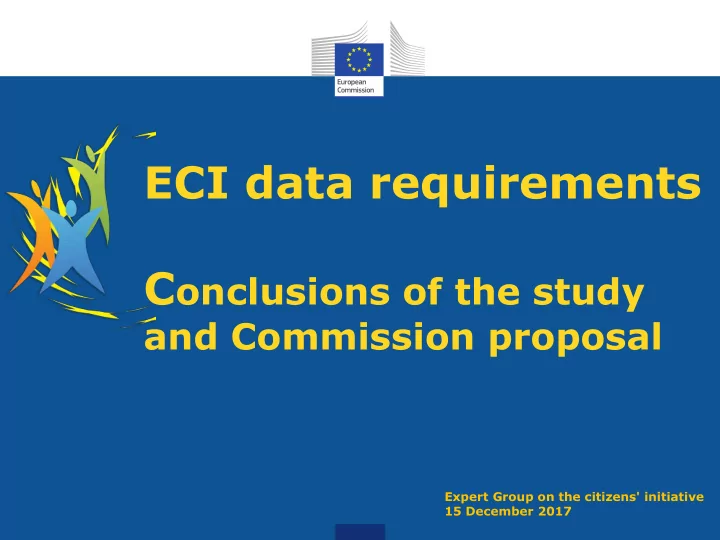

ECI data requirements C onclusions of the study and Commission proposal Expert Group on the citizens' initiative 15 December 2017
• Challenges under the current Regulation • Findings of the study • Policy objectives • Best practices to address these challenges • Conclusions • Content of the Commission proposal •
Challenges under the current Regulation • 13 different sets of data requirements according to Member State • High amount of personal data required in some countries • Diverging criteria (residence/nationality) determining the scope of verification by MS -> exclusion of some EU citizens from their right to support an initiative (namely Irish and British citizens living in France, Portugal, the Czech Republic, Bulgaria, Austria and outside of the EU)
Findings of the study • Similar national or regional participatory instruments require signatories to provide fewer data than for the ECI (75% of those instruments). • Limited coherence between the data collected and the data used for verification – 10 MS use fewer data for verification than signatories are required to provide • The current verification approach is appropriate
Findings of the study • Registers used for verification: in most MS, population registers (incl. 16 and 17 y.o.) • Sensitivity to provide data: In most MS, no particular concern; • Where concerns raised, primarily in relation to the • personal identification number; Varying across MS; • Depends on the trust in the entity collecting the data •
Policy objectives • To simplify the data requirements for signatories of statements of support (proportionally to the outcome); • To ensure all eligible EU citizens are able to support an ECI; • To ensure only eligible citizens are able to support an ECI while minimising the burden of verification; • To ensure that the personal data of supporters is safeguarded.
Best practices to address these challenges (based notably on comparative analysis with similar instruments at national and regional level): Data requirements should be: • minimised • coherent (data collected should be the data used for verification) • proportional to the outcome of the instrument • More use of technology
Conclusions (1) • Use of one criterion to define which MS verifies: nationality • Data simplification/harmonisation: Most common set of data in registers : name, surname, • address, date of birth . Address not always a reliable data • Address in some countries more sensitive to provide than • the ID number Alternative set: name, surname, last 4 digits of an ID • number (only 4 digits: further reducing the sensitivity to provide this data without compromising the verification process).
Conclusions (2) Additional options: • Central collection system managed by the Commission • Possibility of scanning the paper statements of support and uploading them in an online collection system (preferred over inputting) • Optional use of eIDs • simplify the requirements • reduce the burden of verification • Limited added value of two-step approaches with reduced sets of data requirements
Content of the Commission proposal (1) • Article 12 • Verification and certification of statements of support by the Member States • 1. Each Member State (the 'responsible Member State') shall verify and certify that the statements of support signed by its nationals comply with the provisions of this Regulation.
Content of the Commission proposal (2) • Currently MS already verify their nationals (with a few exceptions as regards their nationals abroad). • No exclusion • Reduced risk of undetectable double statements • Less administrative burden • Simpler collection process
Content of the Commission proposal (3) • Article 9 • Procedure for the collection of statements of support • Member States shall inform the Commission of whether they wish to be included in part A or B, respectively, of Annex III before 1 July 2019. Member States wishing to be included in part B of Annex III, shall indicate the type(s) of personal identification (document) number of which signatories shall provide the last four characters. •
Content of the Commission proposal (4) • Annex III • - Part A: • Full first names, Family names, Residence, Date of birth • - Part B: • Full first names, Family names, Last four characters of the personal identification number/ • Personal identification document number, Type of personal identification number or document
Content of the Commission proposal (5) • Data set (part A or B) to be chosen by MS based on: • capacity to verify based on the address • taking into account any preference as to the sensitivity to provide certain data in their countries.
Content of the Commission proposal (6) • Article 2 • Right to support a European citizens’ initiative • Every citizen of the Union who is at least 16 years of age has the right to support an initiative by signing a statement of support ('the signatory'), in accordance with this Regulation.
Content of the Commission proposal (7) • Most registers include 16-17 years old • Broadening the support to young people - 10 millions more people - raise their awareness about the EU - increased participation by the younger generation in the democratic debate at EU level. • ECI is for agenda-setting (not voting in an election) = non-binding • Examples where participation of young people in similar instruments is allowed (BE, DE, EE, LU)
Recommend
More recommend